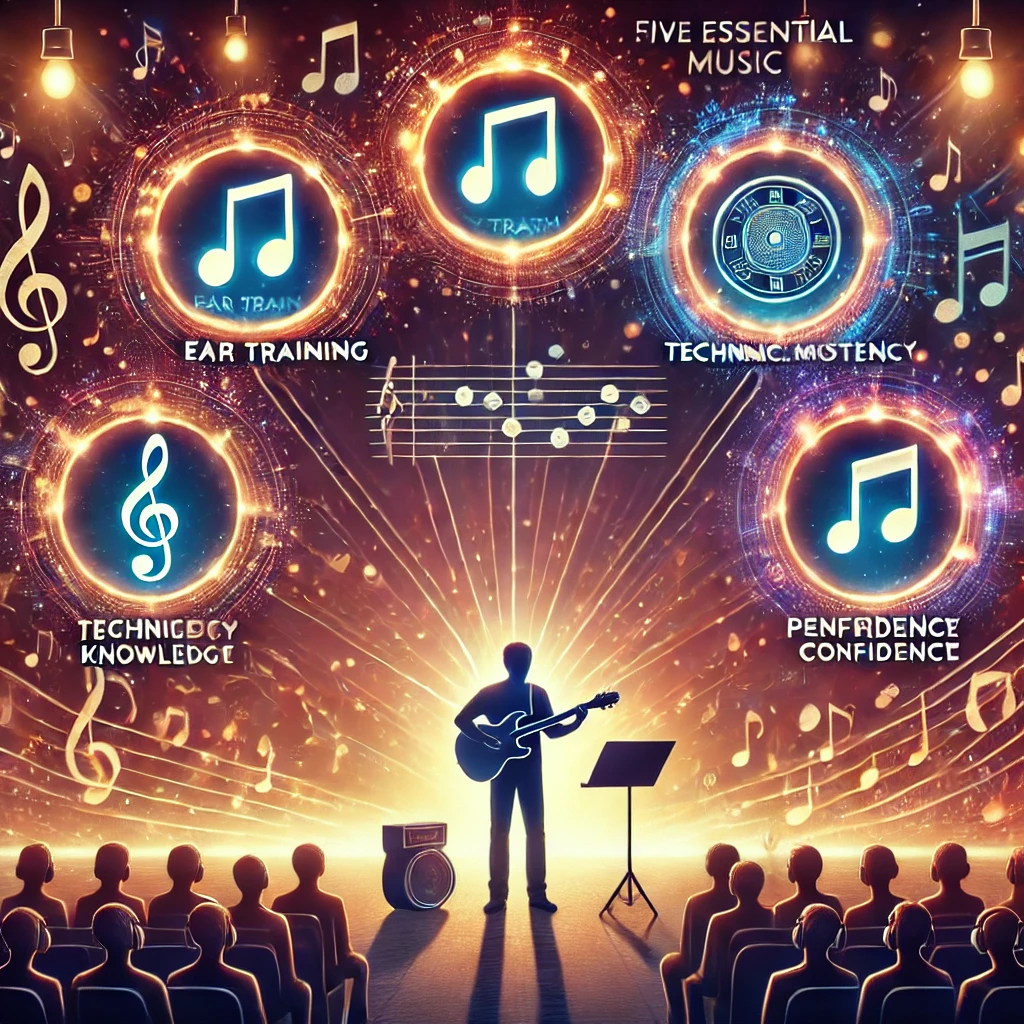Becoming a great musician requires more than just playing an instrument well. To truly grow as a musician, you need to develop a set of core skills that will improve your technique, creativity, and overall musical ability. Whether you’re a guitarist, pianist, singer, drummer, or violinist, these essential skills will help you play more confidently, collaborate with other musicians, and express yourself better through music.
In this guide, we’ll explore five crucial skills that every musician should develop, along with practical tips to improve them.
1. Ear Training: Learning to Recognize Sounds by Ear
Ear training is the ability to recognize notes, chords, and melodies by listening. It helps musicians play songs by ear without needing sheet music, identify chords and melodies when listening to music, improve improvisation by understanding what sounds good together, and sing or play in tune by developing pitch accuracy.
To improve your ear training, practice identifying notes by playing a note on your instrument and trying to sing it back. Use ear training apps like Perfect Ear, Tenuto, and EarMaster to develop your skills. Learn to recognize intervals by starting with basic ones like major thirds (C to E) or perfect fifths (C to G). Try transcribing songs by ear by figuring out simple melodies without looking at sheet music. Singing scales and arpeggios also strengthens your ability to hear and reproduce notes correctly.
Developing a strong musical ear will make you a better performer, composer, and improviser.
2. Rhythm and Timing: Playing with Accuracy
Rhythm is the foundation of music. Even if you play the right notes, your performance won’t sound good if the timing is off. Strong rhythm skills help you play in sync with other musicians in a band or orchestra, stay on beat when performing alone, and improve improvisation by keeping a steady groove.
To improve your rhythm and timing, practice with a metronome by starting slow and gradually increasing speed. Clap or tap rhythms before playing to internalize timing. Use drum backing tracks to develop a strong sense of groove. Count out loud while playing to reinforce rhythm awareness. Playing with other musicians also forces you to stay in time and adjust to different tempos.
Even professional musicians regularly practice with a metronome to refine their timing.
3. Music Theory: Understanding How Music Works
Music theory helps musicians understand what they are playing and why it sounds good. It allows you to read and write music more easily, recognize chord progressions and scales when learning songs, improve composition and improvisation with knowledge of harmony, and communicate with other musicians using common terminology.
Some basic music theory concepts to learn include notes and scales, such as the major and minor scales in different keys. Understanding chords and progressions, like common chords such as C major, G minor, and D7, will help you recognize patterns in songs. Knowing time signatures like 4/4, 3/4, and 6/8 will help you keep the right beat. Learning key signatures and how they influence a song’s mood is useful when playing in different styles. Understanding intervals, or the distances between notes, like major thirds and perfect fifths, will help you build harmonies.
For example, if you know that C, G, Am, and F form a common chord progression, you can quickly learn many pop songs. Even if you don’t study theory deeply, learning the basics makes playing and composing much easier.
4. Technique and Finger Dexterity
Good technique allows you to play efficiently, smoothly, and without injury. Proper technique leads to faster and cleaner playing on any instrument, less hand fatigue and tension while practicing, and greater dynamic control for expressive performances.
To improve your technique, warm up before playing by doing hand, finger, and wrist exercises. Practice scales and technical exercises to build accuracy and strength. Use correct hand position to avoid unnecessary tension. Play slowly at first and increase speed gradually to maintain precision. Record yourself playing and listen for mistakes that need correction.
For guitarists, try 1-2-3-4 finger exercises up and down the fretboard to improve dexterity. For pianists, practicing Hanon exercises will strengthen finger independence. Consistently working on technique prevents bad habits and injuries in the long run.
5. Creativity and Improvisation
Playing music isn’t just about playing notes—it’s about expressing yourself. Improvisation and creativity allow you to compose original music instead of only playing covers, jam with other musicians without needing sheet music, and develop a unique musical style.
To develop creativity in music, experiment with different styles like jazz, blues, or classical, even if it’s not your main genre. Learn basic improvisation techniques by starting with pentatonic scales. Write your own melodies, even if they’re simple, to improve your ability to create music. Change existing songs by playing them in different keys, tempos, or rhythms. Play without sheet music to rely on your ears and musical instincts.
For example, a guitarist can use the A minor pentatonic scale to create blues solos. A pianist can take a simple chord progression like C – G – Am – F and experiment with different rhythms or melodies. The more you explore, the more confident and unique your playing will become.
Conclusion: Master These Skills to Become a Better Musician
To grow as a musician, focus on these five essential skills: ear training to help you recognize sounds and play by ear, rhythm and timing to keep your playing precise and in sync, music theory to understand and communicate musical ideas, technique to allow for smooth, efficient, and injury-free playing, and creativity and improvisation to let you express yourself freely in music.
By practicing these skills consistently, you’ll improve faster, become more confident, and enjoy playing music even more. Start working on these today, and take your musical abilities to the next level! 🎶

